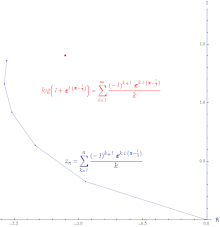
In mathematics, a series is the sum of the terms of a sequence of numbers.
Given a sequence \left \{ a_1,\ a_2,\ a_3,\dots \right \}, the nth partial sum S_n is the sum of the first n terms of the sequence, that is,
:S_n = \sum_{k=1}^n a_k.
A series is convergent if the sequence of its partial sums \left \{ S_1,\ S_2,\ S_3,\dots \right \} converges. In more formal language, a series converges if there exists a limit \ell such that for any arbitrarily small positive number \varepsilon > 0, there is a large integer N such that for all n \ge \ N,
:\left | S_n - \ell \right \vert \le \ \v...